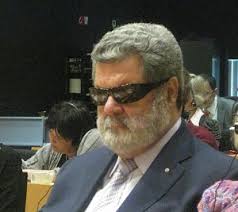Threatening silent cars, inaccessible internet, books without voice – the many fronts on which the EU could intervene, but delays
 Thirty million. There are thirty million people in Europe who are blind or visually impaired, “and it is time to stop treating them like second-class citizens.” Wolfgang Angermann (in spite of his name, which in English would mean angry man) is a kind retired German lawyer, who always speaks with a smile on his lips. Now that he has the time, he explains, he is dedicating himself to what he cares about, like being chairman of the EBU (European Blind Union), the largest European association that defends the interests of the blind and visually impaired.
Thirty million. There are thirty million people in Europe who are blind or visually impaired, “and it is time to stop treating them like second-class citizens.” Wolfgang Angermann (in spite of his name, which in English would mean angry man) is a kind retired German lawyer, who always speaks with a smile on his lips. Now that he has the time, he explains, he is dedicating himself to what he cares about, like being chairman of the EBU (European Blind Union), the largest European association that defends the interests of the blind and visually impaired.
He is worried now, as is his association, because the changing world risks moving in a direction that, for those who have this particular disorder, to be taken into account less than they should be. There are three issues that led the EBU to meet with reporters in Brussels today on account of the European Day of Disabled Persons to bring a few issues to everyone’s attention: the right to access reading, the development of new technologies “on line” and, here it’s a matter of survival – the new electric or hybrid cars.
Rodolfo Cattani, Italian Chairman of the EBU Commission for liaising with the European Union, addressed the auto issue. “Silent cars are a new problem, and we do not want them to be a danger,” he explained. The issue is that a blind person can hear a car approach only when it exceeds 40 miles per hour, thanks to the sound of the tires on asphalt. So in the city, under that speed, they do not hear it except for the noise of the engine, which electric cars don’t have. After a long battle with the Commission and Council and car manufacturer lobbyists, a law for this was added but it is still too incomplete. “The trilogy ended November 5th – Cattani says – but the text is still secret; it will be unveiled in Parliament in January.” The issue is about time and the manner of introduction of AVAS, the system of sounds that the cars should produce. “The Council wants to make having this equipment mandatory in 4-6 years, while also allowing drivers to disable it – says Cattani – which is very dangerous.” Off the record, it comes to light that the opponents to these security systems are the manufacturers, who fear an increase in costs, but in the meantime are also discussing the possibility of each having their own “beep-beep” sound, characteristic of their brand. Meanwhile, as Parliament strongly supports the EBU’s reasons, while the Commission and Council equivocate, the amount of silent cars increases, also increasing the dangers, which will not only affect the blind, but also children and some distracted adults.
“Access to information is a human right,” he said, then with his usual smile, Angermann, introduces the theme of books, which are published in formats accessible to the blind (such as audio or Braille) in less than 5% of production in advanced countries. In the poorest countries they don’t even reach 1%. “It ‘a situation that must end,” warned the German, pointing out that in Marrakesh last June, in the presence of American singer Stevie Wonder, a treaty was approved, “despite opposition from the Commission and the EU Council,” which includes trade and international copyright treaties on books for the blind. However, at least twenty countries must ratify it to make it possible to reduce publishing rights and to enable the international trade of translations suitable for these people. “We ask the Commission to support the ratification process – explains Angermann – but it seems that for them this is not urgent. We ask for the European MEPs to help pressure also on this issue. The Commission must ratify- now!”
And then there’s the third issue of modernity: the Internet. For those who cannot see, it is largely a hidden world, with totally inadequate accessibility, while it is increasingly important to be able to access it, given the number

of services, public and private, that are moving there. Not even the European Council website is accessible to all blind people, but only to those who speak English and if the text is available in English. The results in other languages are ridiculous, “because a device is lacking, one that costs very little, to let the computer know that the person reading is not an English speaker, but they didn’t think about that,” says the young Belgian Bart Simons, Head of New Technologies at EBU. Now there a directive is discussion to require that public service sites are equally accessible to blind people; but here too, again, in particular, the Council wastes time, beating around the bush, “and we, on the other hand, would like to accelerate – explains Simons – because in May there will be elections for the European Parliament, and if it is not complete, we risk losing months or years to pick up the pieces.” Even the blind want to be able to buy a plane ticket or an item on E-Bay, “we want a simple thing, not an impossible thing; we want to be able to do what others can do,” says Simons.
Among other things, it was explained, if you do not offer services for the blind “in” production – like cars, or Internet services, or machines to buy bus tickets in public services, “then costs rise because you have to create the special structures to provide this information or products or whatever it may be. As explained by Carine Marzin, an Executive of EBU, “governments should look at the problem in the long-term, not in immediate savings of completing a structure, but think of the costs there will be afterward.”
Lor


![Serbatoi silos contenitori idrogeno verde h2
generate ai serbatoio [foto: imagoeconimica]](https://www.eunews.it/wp-content/uploads/2024/07/Imagoeconomica_1995971-120x86.jpg)


